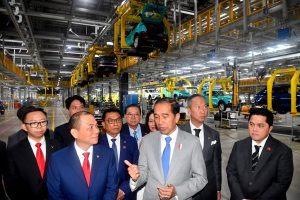South China Sea tensions and economic cooperation topped the agenda during Indonesian President Joko “Jokowi” Widodo’s state visit to Vietnam over the weekend. On Friday, Jokowi met his Vietnamese counterpart Vo Van Thuong in Hanoi, with subsequent state media reports claiming that the two leaders discussed closer cooperation on trade and investment and the importance of keeping a lid on intensifying maritime frictions between China and rival maritime claimants in the South China Sea.
Jokowi’s visit to Hanoi from Thursday to Saturday was part of a Southeast Asian tour that took him to the Philippines last week and was followed by a stop in Brunei this weekend, prior to his return to Indonesia yesterday.
According to a report from the state-run Voice of Vietnam, which was translated and reported by BenarNews, the two leaders “reaffirmed the importance of peace, stability, safety, security, and freedom of navigation and overflight in the East Sea.” (The East Sea, or Bien Dong, is Vietnam’s name for the South China Sea.)
The meeting follows months of intensifying tensions in the disputed waterway, where China has ramped up its efforts to advance its expansive maritime claims. In particular, it has aggressively laid claim to waters claimed by the Philippines, leading to a string of tense encounters, including several in which Chinese ships have rammed Philippine vessels seeking to resupply the small detachment of troops on Second Thomas Shoal in the Spratly Islands.
According to BenarNews, once again quoting the Voice of Vietnam, the two sides also “pledged to fully and effectively implement” the Declaration on the Conduct (DOC) on the South China Sea, signed between China and the Association of Southeast Asian Nations (ASEAN) in 2002, and to “push ahead with negotiations” for the long-awaited Code of Conduct (COC).
The COC, which has been a perennial agenda item for China and ASEAN since the DOC’s signing, aims to create a series of guidelines to guide claimant states’ behavior pending the resolution of the welter of overlapping claims in the South China Sea. However, many observers believe that China’s constant reference to the COC, has no serious intention of finalizing an agreement, and that its current behavior is hardly indicative of any desire for one.
Notably, Jokowi and Thuong were quoted as agreeing that any COC should be “substantive, effective [and] in line with international law.” This meshed with the view that Jokowi expressed during his visit to the Philippines, where he and President Ferdinand Marcos Jr. “stressed the universality” of the 1982 United Nations Convention on the Law of the Sea (UNCLOS), “which sets out the legal framework that governs all activities in the oceans and in the seas.”
According to a Reuters report, which cited a joint statement issued by the two sides, Jokowi’s visit saw the two sides sign a memorandum of understanding on cooperation in the field of information technology and communications. Thuong also expressed a desire to boost bilateral trade to $15 billion annually, up from around $14.1 billion last year.
On Saturday, Jokowi paid a visit to an electric vehicle factory in northern Vietnam run by the local automaker VinFast, which last September announced plans to invest $1.2 billion in the Indonesian market. This included around $200 million for the construction of a factory in the country that it hopes to be operational by 2026. Reuters reported that during his talks with Thuong, Jokowi praised VinFast’s intention to invest in Indonesia. In return, Thuong “encouraged Indonesian firms to invest more in Vietnam, including in the banking sector.”
The other curious news to emerge from Jokowi’s visit was the absence of Nguyen Phu Trong, the head of the Communist Party of Vietnam, who prior to his appearance at a National Assembly meeting today, had not been seen in public since December 26. Trong, who regularly receives visiting foreign leaders during state visits, also missed a meeting last week with Lao Prime Minister Sonexay Siphandone.
Prior to his reappearance in public, Trong’s absence prompted all manner of rumor and media speculation. But it does highlight the pivotal role that Trong currently plays in Vietnam’s opaque politics, and the uncertainties that would arise in the event of his incapacitation. The 79-year-old, who has a recent history of health issues, is now in this third term as party chief, and is expected to hand over the post – the most powerful of Vietnam’s four major political leadership posts – to a successor at the next party congress in 2026.

































